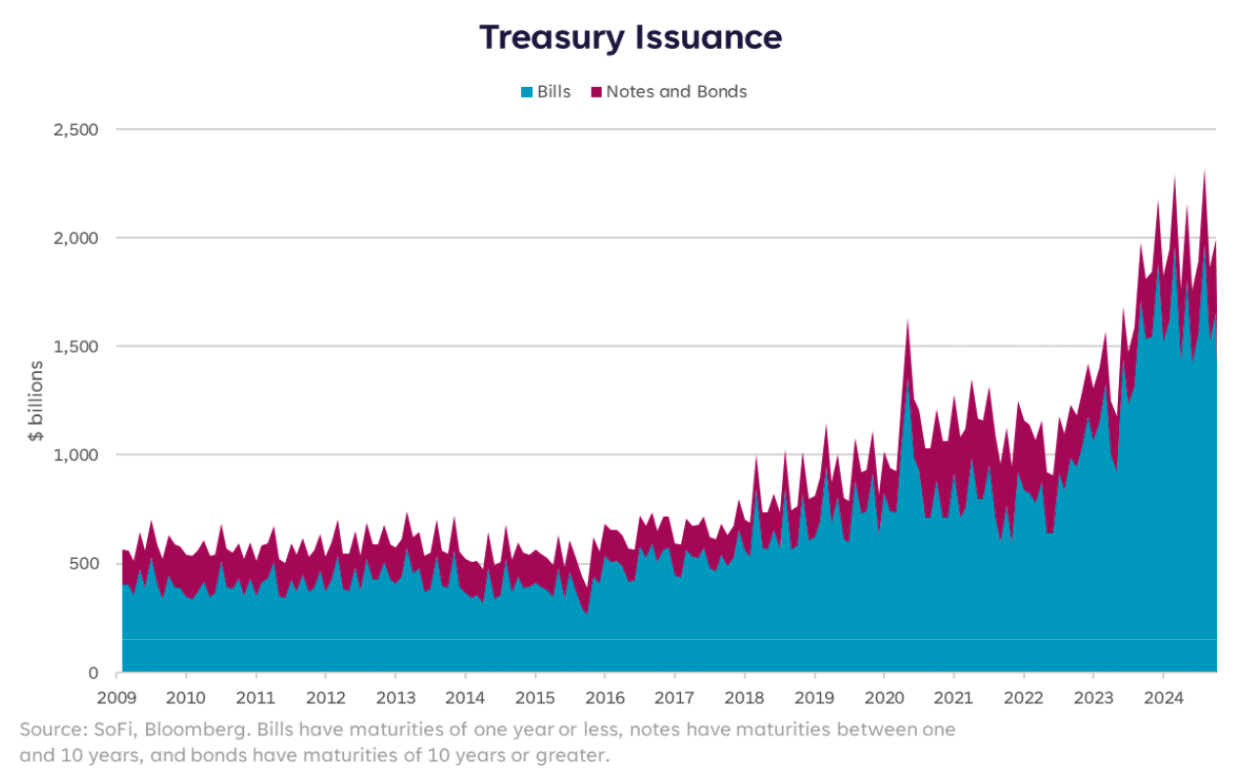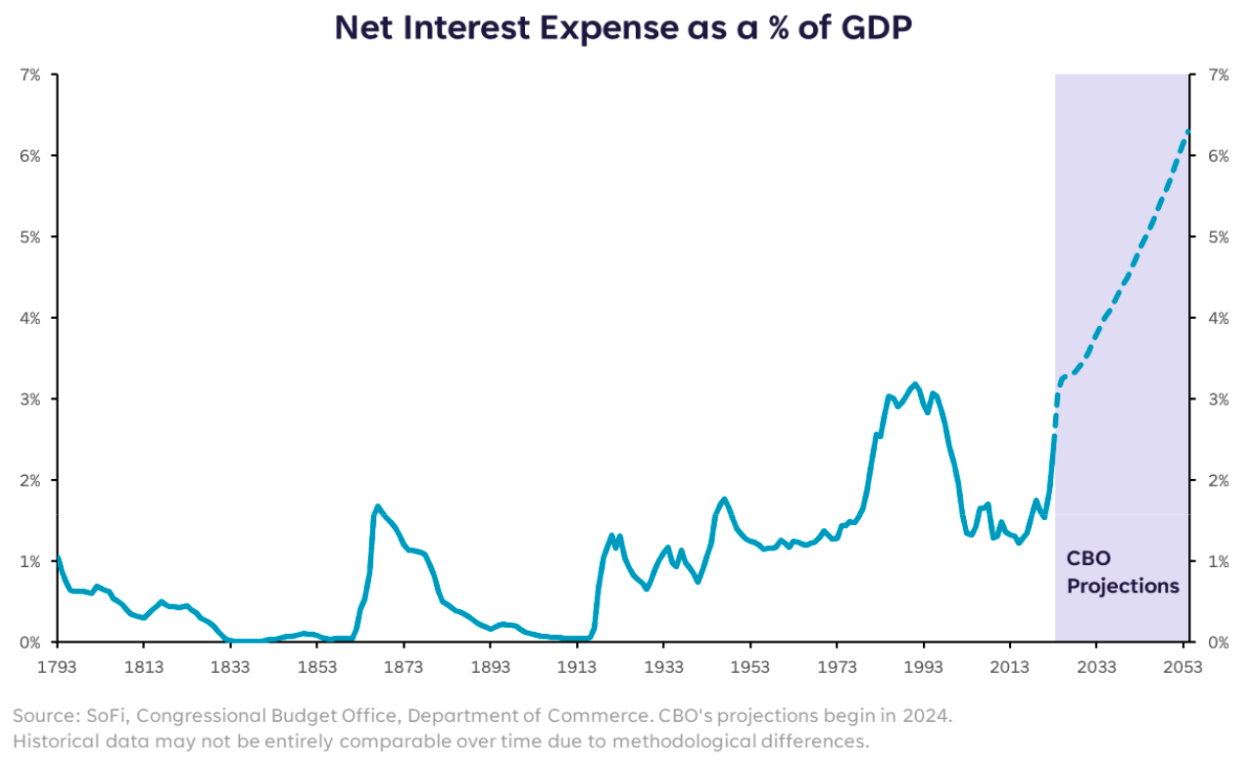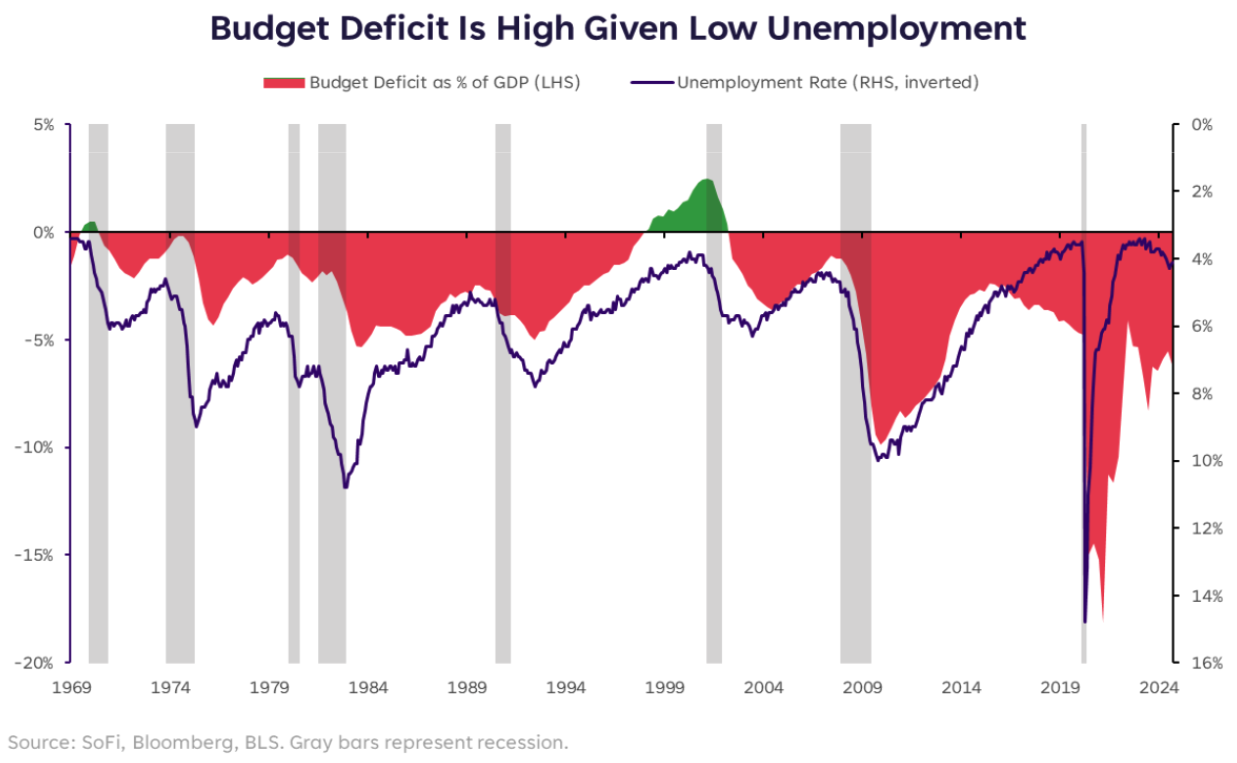Decoding Deficits

Estimated reading time: 0 minutes
I.O.U.
Spoiler alert: There’s a U.S. election coming in hot. That simple fact has made certain topics more mainstream in recent days and weeks, one of which is our national debt level and the size of our ongoing budget deficit.
Without getting into the political weeds, investors generally expect that the budget deficit will stay elevated regardless of who wins the election, so this is an issue that’s here to stay for a while.
A big reason the deficit has garnered more chatter is because of the swift rise in Treasury yields we’ve seen over recent weeks. Some of the rise can be attributed to a hotter-than-expected economy, but investors are speculating that it’s also due to concerns of a ballooning U.S. debt level and the expectation for further borrowing in the form of issuing more Treasurys.Also, the debt ceiling limit is suspended until January 1. Since that’s only two months away, more attention is being paid to the topic. If it gets resolved and more government borrowing is allowed, the issuance of Treasurys could go even higher in 2025. The chart below shows how much Treasury issuance has already increased in recent years. Hence people’s concern.

In simple economic terms, the supply of Treasurys has increased and is expected to continue rising. If demand for Treasurys increases the same amount or more, yields would stay contained and Treasury prices would stay supported. But what has happened lately is that demand for Treasurys has waned. The Federal Reserve is no longer as big of a buyer, and it appears that other global central banks are not picking up the slack either. Another read of Treasury demand can be seen in auction results, which have also been weaker.
Not to mention, all of the Treasurys issued since March 2022 have been during a rising rate environment, meaning the coupons on those bonds (i.e., the interest the Treasury has to pay investors) are higher than before, which increases the government’s interest expense.

According to the Congressional Budget Office in the chart above, the net interest expense as a percent of GDP is going to skyrocket in coming years if we stay on this path. Of course, this is just a projection and could change dramatically, but it gives a sobering view of the risks.
Relationship Problems
We imagine there are a lot of relationship problems in Washington, but that’s for another piece. Or better yet, for someone else to write. We focus on relationship problems between market and economic variables, and the two in the chart below are in a bit of a kerfuffle.
The shaded red/green regions represent the budget deficit as a percent of GDP (latest reading is -6.3%) and the blue line represents the unemployment rate (4.1% for September). We’ve inverted the unemployment rate to better show how well the two variables usually track each other.
There have been periods in the past where big spreads between the two have occurred and persisted, between 2015-2019, for example. That period was obviously ended by the Covid-19 pandemic. Today, the spread between these variables is wide again and likely not sustainable.

Considering that we’ve been in this situation for the better part of four years, it’s starting to feel long in the tooth. The big question however, is how the relationship might change — will unemployment rise or will the deficit fall? Or some combination of both?
That type of movement in either variable is not likely to be a tailwind for the U.S. economy. In recent years, government spending has helped pull our economy out of the pandemic and buoy it for a while afterwards while we waited for the private sector and consumer activity to come roaring back. And roar it did.
But now, with an unemployment rate that appears to have bottomed, and a deficit that remains larger than pre-pandemic, investors are worried about what the collateral damage to markets can be. So far, a rise in Treasury yields is all we’ve seen. Whether they continue rising and pressuring stocks is the next level of concern. Despite the deficit and Treasury borrowing activity being almost purely a political topic, next week’s election doesn’t seem to be a major factor in changing this situation.
Yields remain the main event that we watch more closely every day.
Disclaimer
SoFi Securities (Hong Kong) Limited and its affiliates (SoFi HK) may post or share information and materials from time to time. They should not be regarded as an offer, solicitation, invitation, investment advice, recommendation to buy, sell or otherwise deal with any investment instrument or product in any jurisdictions. Keep in mind that investing involves risk, and past performance of an asset never guarantees future results or returns. It’s important for investors to consider their specific financial needs, goals, and risk profile before making an investment decision.
SoFi HK does not make any warranties about the completeness, reliability and accuracy of this information and will not be liable for any losses and/or damages in connection with the use of this information.
The information and materials may contain hyperlinks to other websites, we are not responsible for the content of any linked sites. The information and analysis provided through hyperlinks to third party websites, while believed to be accurate, cannot be guaranteed by SoFi HK. These links are provided for informational purposes and should not be viewed as an endorsement. The risk involved in using such hyperlinks shall be borne by the visitor and subject to any Terms of Use applicable to such access and use.
Any product, logos, brands, and other trademarks or images featured are the property of their respective trademark holders. These trademark holders are not affiliated with SoFi HK or its Affiliates. These trademark holders do not sponsor or endorse SoFi HK or any of its articles.
Without prior written approval of SoFi HK, the information/materials shall not be amended, duplicated, photocopied, transmitted, circulated, distributed or published in any manner, or be used for commercial or public purposes.

About SoFi Hong Kong
SoFi – Invest. Simple.
SoFi Hong Kong is the All-in-One Super App with stock trading, robo advisor and social features. Trade over 15,000 US and Hong Kong stocks in our SoFi App now.


